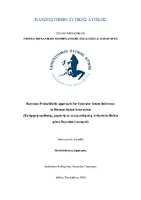| dc.contributor.advisor | Νικολάου, Γρηγόριος | |
| dc.contributor.author | Παναγόπουλος, Δημήτριος | |
| dc.date.accessioned | 2020-10-26T13:04:03Z | |
| dc.date.available | 2020-10-26T13:04:03Z | |
| dc.date.issued | 2020-10 | |
| dc.identifier.uri | http://okeanis.lib2.uniwa.gr/xmlui/handle/123456789/5447 | |
| dc.description.abstract | Στο πεδίο εφαρμογής της παρούσας εργασίας βρίσκεται η προσπάθεια εξέλιξης του ήδη υπάρχοντος συστήματος ελέγχου, ονόματι Mixed-Initiative (MI), όπως αυτό έχει σχεδιαστεί και υλοποιηθεί στο κέντρο ερευνών Extreme Robotics Lab του Πανεπιστημίου του Birmingham. Ο ελεγκτής ΜΙ αναφέρεται στη διομότιμη (peer-to-peer) συνεργασία μεταξύ του χειριστή και του ρομπότ όσον αφορά την εξουσία που πρέπει να παρθεί για να ξεκινήσουν οι κατάλληλες ενέργειες και εναλλαγές στα επίπεδα αυτονομίας (Level(s) of Autonomy – LOA). Τα επίπεδα αυτονομίας (LOA) κυμαίνονται από καθαρό τηλεχειρισμό (ο άνθρωπος χειριστής έχει τον απόλυτο έλεγχο των κινήσεων του robot) μέχρι πλήρη αυτονομία (το ρομπότ έχει τον έλεγχο κάθε επιδεξιότητας) προσδιορίζοντας έτσι τη μεταβλητή αυτονομία (Variable Autonomy), η οποία αναφέρεται στην προσέγγιση ενσωμάτωσης πολλών διαφορετικών επιπέδων αυτόνομων δυνατοτήτων (LOA). Σκοπός της μελέτης είναι η αποτύπωση βελτιωτικών μέσων/εργαλείων και συγκεκριμένα η προσθήκη ενός αλγορίθμου μαθηματικής εκτίμησης που προσδιορίζει την πρόθεση ενός ανθρώπου χειριστή στα πλαίσια της συνεργασίας μεταξύ του ιδίου και του αυτοκινούμενου ρομπότ που χειρίζεται εξ’ αποστάσεως. Το πρώτο ζήτημα που αναπτύσσεται είναι η σχεδίαση ενός τέτοιου αλγορίθμου εκτίμησης, ο οποίος θα έχει την ικανότητα να εξάγει συμπεράσματα για την κρίση/επιθυμία του χειριστή συγκεντρώνοντας πληροφορίες από το περιβάλλον μέσα στο οποίο κινείται το ρομπότ. Αφού οι πληροφορίες συλλεχθούν, σε επόμενο στάδιο εισάγονται/προσκολλούν στο συνολικό σύστημα ελέγχου MI παρέχοντάς του τη δυνατότητα εξάλειψης σφαλμάτων και ταυτόχρονα καλύτερης επίδοσης | el |
| dc.format.extent | 57 | el |
| dc.language.iso | el | el |
| dc.publisher | Α.Ε.Ι. Πειραιά Τ.Τ. | el |
| dc.rights | Αναφορά Δημιουργού-Μη Εμπορική Χρήση-Όχι Παράγωγα Έργα 3.0 Ελλάδα | * |
| dc.rights.uri | http://creativecommons.org/licenses/by-nc-nd/3.0/gr/ | * |
| dc.subject | TPSH::Επιστήμη Υπολογιστών::Τεχνητή Νοημοσύνη | el |
| dc.subject | TPSH::Τεχνολογία::Αυτόματος Έλεγχος::Ρομποτική | el |
| dc.title | Εκτίμηση πρόθεσης χειριστή σε αλληλεπίδραση Ανθρώπου-Robot μέσω Bayesian λογισμού | el |
| dc.title.alternative | Bayesian probabilistic approach for operator intent inference in Human-Robot interaction | el |
| dc.type | Πτυχιακή εργασία | el |
| dc.contributor.committee | Βασιλειάδου, Σουλτάνα | |
| dc.contributor.committee | Δρόσος, Χρήστος | |
| dc.contributor.department | Τμήμα Μηχανικών Αυτοματισμού Τ.Ε. | el |
| dc.contributor.faculty | Σχολή Τεχνολογικών Εφαρμογών | el |
| dc.subject.keyword | Αλληλεπίδραση ανθρώπου-ρομπότ | el |
| dc.subject.keyword | Human-robot interaction | el |
| dc.subject.keyword | HRI | el |
| dc.subject.keyword | Robot Operating System | el |
| dc.subject.keyword | ROS | el |
| dc.subject.keyword | Gazebo | el |
| dc.subject.keyword | Ελεγκτής Mixed-Initiative | el |
| dc.subject.keyword | Κανόνας Bayes | el |
| dc.description.abstracttranslated | The scope of this work is to enhance an existing control system called Mixed-Initiative (MI), as designed and implemented in Extreme Robotics Lab (ERL) research center at the University of Birmingham. The MI controller refers to the peer-to-peer cooperation between the human operator and the robot regarding the authority that must be taken for the appropriate actions (switching) on the Level(s) of Autonomy (LOA) to be initiated. LOA can range from pure teleoperation (the human operator has complete control over the robot’s movement) to complete autonomy (the robot controls the process of navigation), defining the Variable Autonomy, which refers to the approach of integrating many different LOA. The purpose of this study is to describe improvements or tools and in particular the addition of a mathematical estimation algorithm that infers the intention of a human operator in the context of cooperation between himself/herself and the robot itself. The aim is the design of such an estimation algorithm which will have the ability to predict the operator’s judgement/desire by gathering information from the environment in which the robot moves. Once the information is collected, it is introduced/attached to the overall MI control system allowing to eliminate errors and to inform the policies for providing a better performance. | el |


